Introduction
In a world where efficiency and accuracy are paramount, organizations are increasingly turning to Robotic Process Automation (RPA) as a solution to streamline operations and enhance productivity. RPA technology empowers businesses to automate repetitive, rule-based tasks, freeing up valuable human resources for more strategic initiatives.
As companies strive to improve their operational effectiveness, the role of the RPA Administrator has emerged as a cornerstone of successful automation implementation. This article delves into the multifaceted responsibilities of RPA Administrators, the essential skills they must possess, and the critical impact they have on driving organizational success in an ever-evolving digital landscape.
By understanding the significance of RPA and the vital contributions of its administrators, businesses can unlock the full potential of automation and position themselves for sustained growth and competitiveness.
Introduction to Robotic Process Automation (RPA)
Robotic Process Automation (RPA) is a transformative technology that allows an RPA administrator to leverage software robots to automate repetitive, rule-based tasks traditionally performed by human workers. A recent case study highlights how a mid-sized company utilized GUI techniques to address manual data entry errors, slow software testing, and difficult legacy system integrations. By implementing RPA, the RPA administrator helped the entity achieve:
- A 70% decrease in data entry mistakes
- A 50% enhancement in testing procedures
- An 80% boost in overall workflow efficiency
This showcases the considerable influence of mechanization on operational effectiveness and software quality.
Notably, the company achieved a return on investment (ROI) within six months of implementation, underscoring the financial benefits of RPA. In an era where the demand for accuracy and speed is paramount, the RPA administrator plays a critical role in helping businesses optimize their workflows. The pre-pandemic environment indicated that 88% of appointments were still organized manually, resulting in delays of up to two months—highlighting the crucial need for systematization solutions.
RPA applications allow organizations to redirect their focus from mundane tasks to strategic initiatives, and this process is often overseen by an RPA administrator across various industries, including finance, healthcare, and logistics. Recent advancements in RPA technology have further amplified its capabilities, with projections indicating that small and medium-sized enterprises (SMEs) are set to adopt RPA solutions at an impressive growth rate of 25% annually. Furthermore, a significant 90% of CFOs have acknowledged their firms’ investments in payment streamlining, signaling a widespread recognition of the role of the RPA administrator in unlocking RPA’s potential.
As Slack notes, ‘On average, workers save 3.6 hours per week by utilizing automated processes,’ highlighting the efficiency benefits of RPA. With RPA, the role of the RPA administrator is crucial as entities not only achieve heightened productivity but also enhance service delivery and secure a competitive edge in the market. In fact, a study on employee satisfaction with automated systems revealed that:
- 91% of employees believe these technologies save time and enhance work-life balance
- 89% report increased job satisfaction as a direct result of RPA implementation
This case study illustrates RPA’s positive impact on employee satisfaction and productivity, particularly in the healthcare sector, reinforcing the argument for its adoption across various sectors.
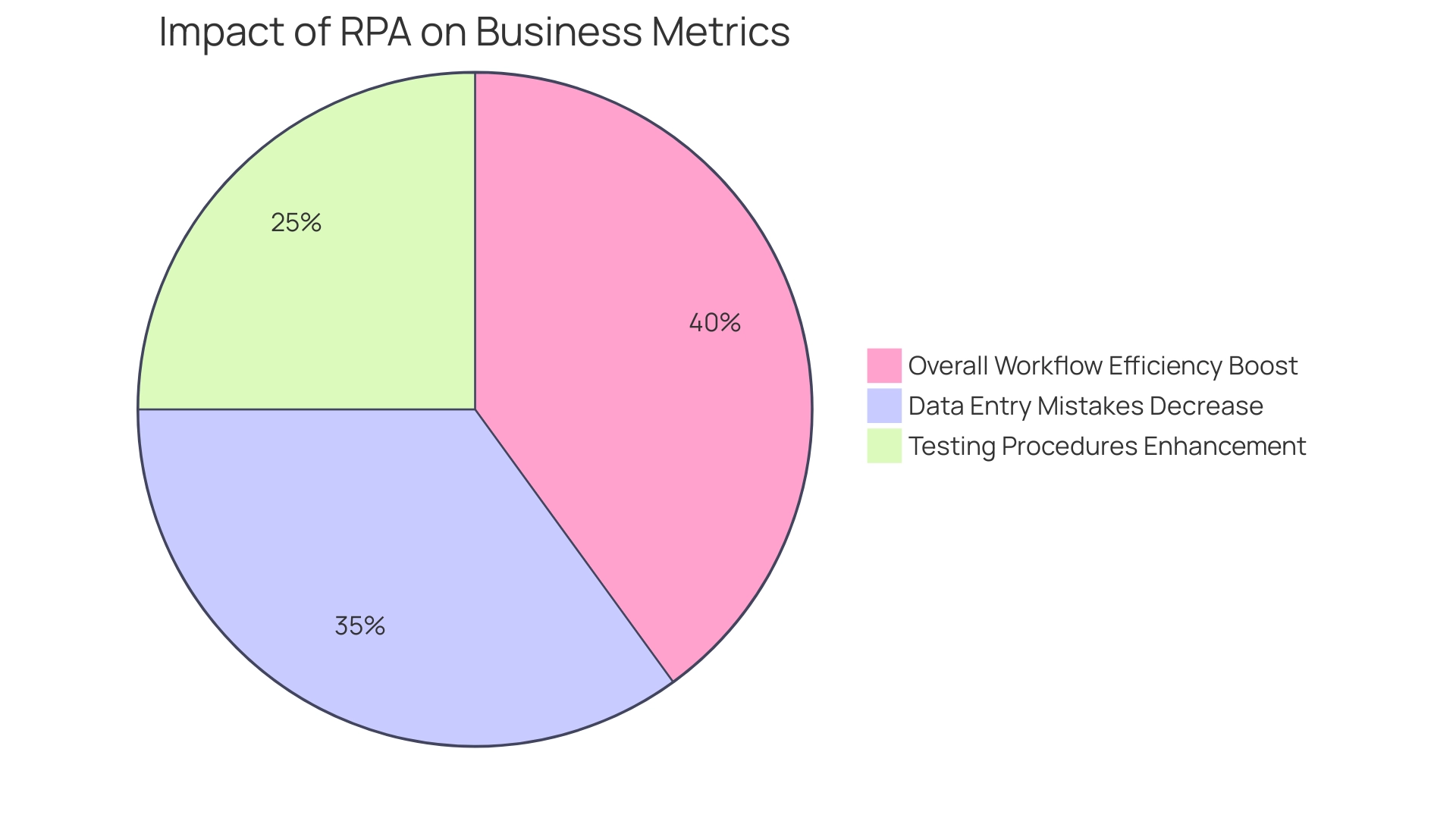
Key Responsibilities of an RPA Administrator
The successful implementation and ongoing management of robotic process automation (RPA) solutions within an organization is integral to the role of the RPA Administrator. Their role encompasses several critical responsibilities that drive efficiency and effectiveness in business operations:
-
Bot Development and Maintenance: RPA specialists are tasked with designing, testing, and maintaining software bots that automate key business processes.
This often involves collaboration with business analysts to clearly understand process requirements, ensuring that the developed bots, such as those powered by EMMA RPA, operate effectively and meet organizational needs. -
Monitoring and Troubleshooting: A crucial aspect of their role is the continuous monitoring of automated processes. RPA managers proactively identify issues or bottlenecks that may disrupt operations.
In the event of problems, they troubleshoot and resolve these issues promptly, minimizing downtime and ensuring seamless operational continuity, ultimately enhancing productivity and morale. -
User Management: Managing user access and permissions within the RPA system is another essential responsibility. RPA managers ensure that only authorized personnel can interact with or modify the bots, thereby upholding security and compliance standards essential to the robotic process framework.
-
Documentation and Reporting: Comprehensive documentation of processes, bot configurations, and any modifications is vital for transparency and knowledge transfer within the organization. RPA managers also produce comprehensive reports on bot performance and operational metrics, offering stakeholders insights into the efficiency and influence of mechanization initiatives, including the seamless digitalization provided by tools like Microsoft Power Automate. RPA Administrators play a key role in fostering a culture of continuous improvement.
By examining performance data and collecting user feedback, they recognize opportunities for additional mechanization and process enhancement. This proactive approach allows them to recommend enhancements to existing bots or develop new solutions that contribute to increased operational efficiency and help combat staffing shortages and outdated systems.
In terms of financial context, the average salary for an intern RPA developer in Florida is $35,587 annually, while entry-level RPA developers in New Brunswick can expect an average salary of $70,746. Notably, Hawaii offers an average annual salary of $104,172 for entry-level RPA developers, illustrating significant regional salary differences and highlighting the value of RPA roles across various locations. This discrepancy underscores the importance of investing in RPA solutions, as they not only enhance operational efficiency but also contribute to the retention of skilled employees by alleviating repetitive tasks and improving job satisfaction.
The multifaceted role of the RPA Administrator is crucial in ensuring the success of robotic process initiatives, positioning them as key players in driving an organization’s operational excellence and adaptability in an increasingly automated environment.
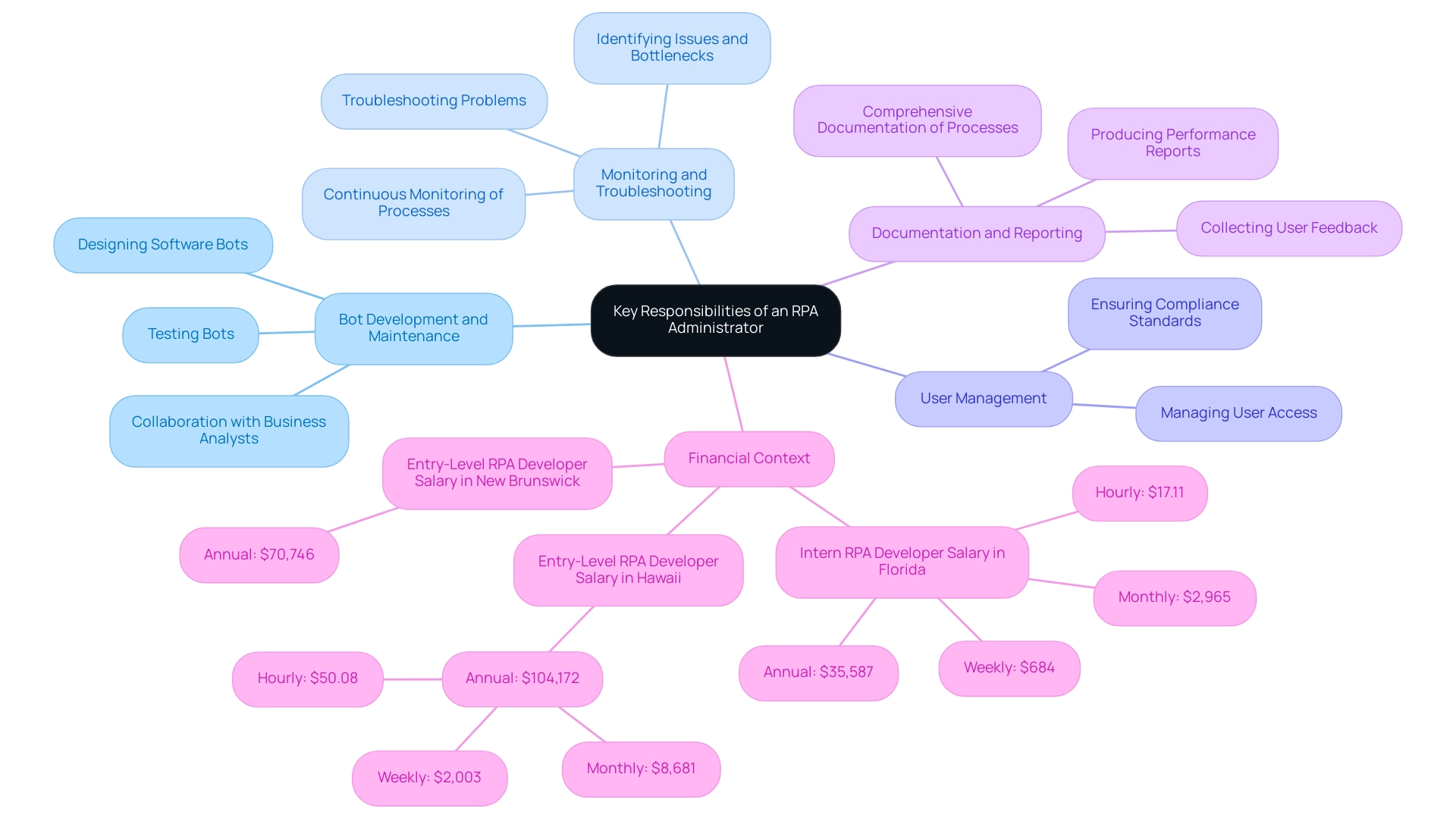
Skills Required for an RPA Administrator
To excel as an RPA Administrator, it is imperative to possess a blend of technical and soft skills, particularly in a landscape where Robotic Process Automation (RPA) is essential for enhancing operational efficiency. Key competencies include:
-
Technical Proficiency: A comprehensive understanding of RPA tools such as UiPath, Automation Anywhere, and Blue Prism is fundamental.
Additionally, knowledge of programming languages like Python or Java can significantly enhance bot development capabilities, aligning with the rapid advancements in the AI landscape. -
Analytical Skills: Exceptional analytical abilities are crucial for RPA managers to assess existing processes and discover opportunities for efficiency. This entails a thorough assessment of current workflows to determine the feasibility of proposed automation solutions, thereby unlocking the potential for enhanced productivity and informed decision-making through Business Intelligence.
-
Problem-Solving Abilities: RPA professionals must possess strong problem-solving skills to address issues effectively and devise viable solutions. Being proactive in identifying potential challenges before they escalate ensures timely corrective actions are implemented, thus overcoming common technology implementation challenges.
-
Communication Skills: Effective communication is essential for RPA managers to collaborate with a variety of stakeholders, including business analysts, IT teams, and end-users. The ability to translate complex technical information into understandable terms for non-technical audiences is vital for successful project outcomes, particularly when implementing tailored AI solutions.
-
Project Management: Understanding project management methodologies empowers RPA professionals to supervise various robotic process initiatives effectively, ensuring projects are completed punctually and adhere to quality standards.
These skills are essential for an RPA administrator to skillfully manage the intricacies of robotic processes, enabling them to achieve successful outcomes within their companies. With UiPath recently raising $750 million to enhance its RPA platform, the financial backing and growth potential of RPA technologies are evident. Additionally, small and medium-sized enterprises (SMEs) are projected to adopt RPA solutions at a growth rate of 25% annually, further emphasizing the increasing demand for skilled RPA professionals.
As the global RPA market is expected to grow at a CAGR of 27.7% from 2023 to 2028, the importance of these skills cannot be overstated. As Debasis Nayak suggests, ‘Don’t just stop at RPA—broaden your skill set. Explore new technologies and keep pace with the changing landscape.’
Embracing this mindset not only fosters relevance but also opens pathways to new opportunities in a rapidly evolving market.
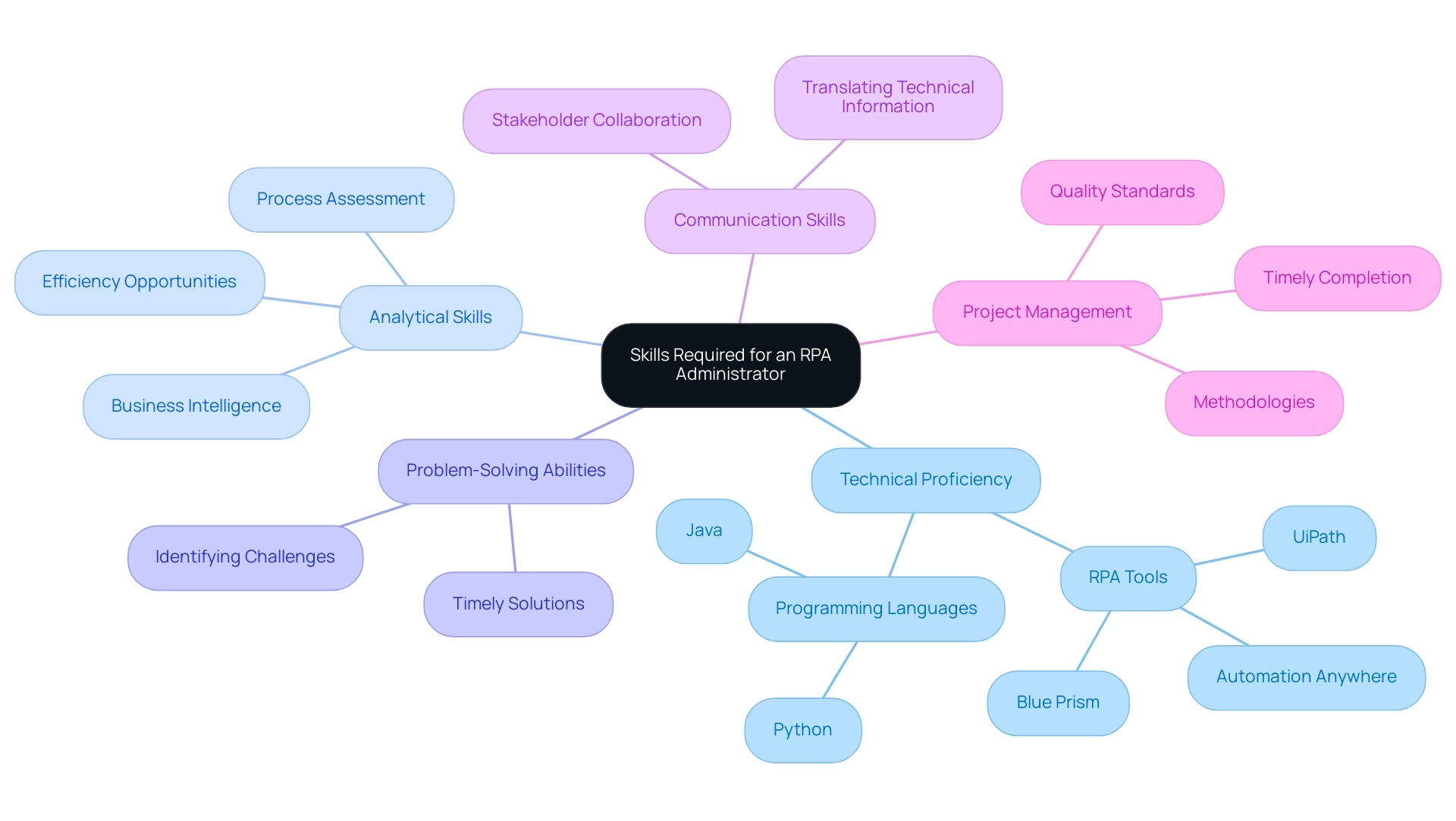
The Importance of an RPA Administrator in Organizations
RPA managers play a vital role in allowing organizations to fully utilize the transformative advantages of robotic process technology. Their specialized knowledge is pivotal for seamless implementation of automation solutions and for amplifying the overall effectiveness of these initiatives. The global RPA market is projected to grow at a CAGR of 27.7% from 2023 to 2028, with small and medium-sized enterprises (SMEs) expected to adopt RPA solutions at a growth rate of 25% annually.
This growth highlights the rising significance and demand for RPA Professionals in the industry.
Here are key reasons that illustrate the indispensable nature of RPA Professionals:
- Maximizing Efficiency: RPA Managers supervise bot performance and continuously identify areas for improvement, ensuring that businesses achieve peak efficiency in their automated processes.
- Mitigating Operational Risks: By monitoring operations in real-time and addressing issues proactively, the role of RPA Administrators is crucial in minimizing risks associated with automated processes, allowing them to run uninterrupted and smoothly.
- Fostering Innovation: These professionals are instrumental in cultivating a culture of innovation within organizations. They recognize new process improvement opportunities and promote the exploration of customized AI solutions and advanced technologies, driving continuous enhancement aligned with strategic objectives.
- Boosting Employee Satisfaction: By automating manual, repetitive tasks, RPA managers free employees to concentrate on strategic, value-added activities. This shift leads to enhanced job satisfaction and greater engagement among the workforce, ultimately contributing to business productivity.
- Aligning with Strategic Objectives: RPA managers ensure that robotic process initiatives are closely aligned with organizational goals. This alignment is crucial for driving growth and contributing to broader business success, particularly in today’s data-rich environment where informed decision-making is essential for competitive advantage.
- Utilizing Business Intelligence: RPA Managers also play a crucial part in combining Business Intelligence tools with automated processes, allowing entities to derive actionable insights from data. This capability is essential for making informed decisions that drive growth and innovation.
- Navigating AI Challenges: In the rapidly evolving AI landscape, RPA Managers assist entities in tackling challenges by deploying customized AI solutions that satisfy specific business requirements, ensuring that automation remains effective and pertinent.
The importance of RPA Managers cannot be overstated; they are essential resources in any entity aiming to utilize automation for operational excellence and sustainable growth in an increasingly automated world. With 90% of invoices not attached to purchase orders processed manually, the potential for automation—and the pivotal role of RPA Administrators in this transformation—becomes evident. Tajammul Pangarkar, CMO at Prudour Pvt Ltd, emphasizes that firms must adapt to these changes to stay competitive.
Their expertise not only streamlines processes but also positions organizations for success in a rapidly evolving AI landscape.
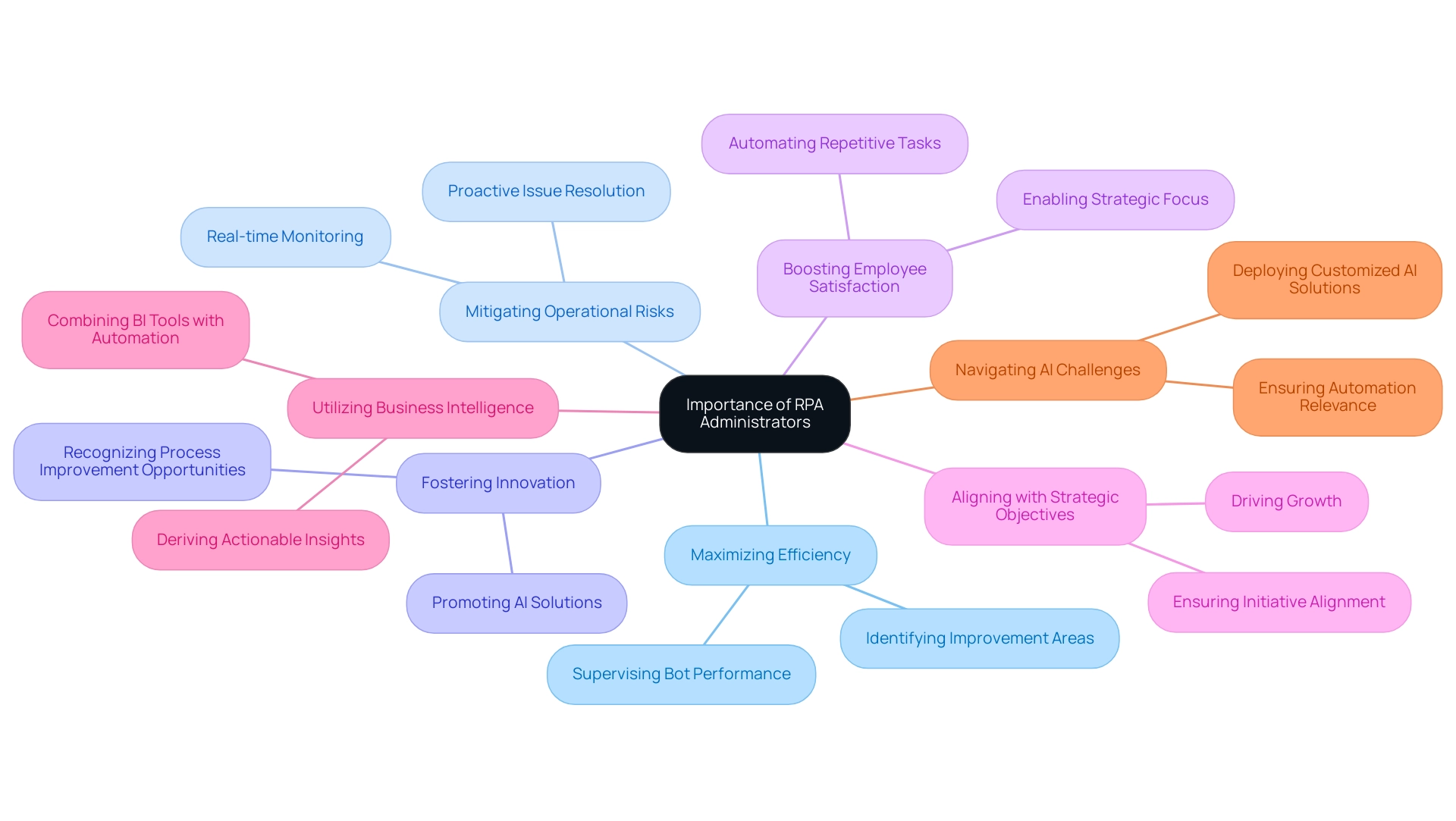
Future Trends in RPA and the Role of the RPA Administrator
As robotic process innovation (RPA) continues to advance, several transformative trends are shaping its future and redefining the role of RPA managers:
- Integration with Artificial Intelligence: The convergence of RPA and artificial intelligence is set to significantly enhance operational capabilities. This integration empowers the RPA Administrator to implement intelligent automated solutions that not only handle repetitive tasks but also learn and adapt over time, thereby driving greater efficiency and effectiveness in operations. Significantly, 83% of employees utilizing AI-driven technology believe that it can help alleviate burnout and improve job satisfaction, highlighting the crucial significance of this integration (UiPath 2023 Automation Generation Report).
- Increased Focus on Security: With the rising adoption of RPA across industries, organizations are placing heightened importance on security and compliance. RPA Managers must stay alert and informed about best practices for securing automated processes and protecting sensitive information, ensuring that these initiatives do not undermine organizational integrity.
- Expansion of RPA Use Cases: As businesses increasingly recognize the substantial value that RPA brings, the spectrum of use cases is broadening beyond traditional applications. RPA managers are encouraged to investigate innovative fields for mechanization, creating customized solutions that meet changing business requirements and challenges. This expansion not only enhances operational efficiency but also contributes to cost reduction and productivity gains.
- Collaboration with IT and Business Units: The role of RPA managers is evolving to encompass greater collaboration with IT departments and diverse business units. This cooperative approach ensures that mechanization strategies are not only aligned with organizational goals but also seamlessly integrated into the existing technology infrastructure, promoting a holistic view of mechanization that frees up teams for more strategic, value-adding work.
- Continuous Learning and Adaptation: In the face of rapid technological advancements, RPA professionals must commit to continuous learning and professional development. Adapting their skills and knowledge to meet the demands of the evolving automation landscape is vital for leveraging the full potential of RPA technologies, including the transformation of raw data into actionable insights that drive informed decision-making.
In summary, the role of the RPA administrator is positioned at the forefront of navigating the future of automation. By embracing these trends, including the integration of generative AI as outlined in the case study ‘Trends in RPA for 2024,’ they can ensure that their organizations fully harness the capabilities of RPA while adeptly responding to emerging challenges and opportunities.
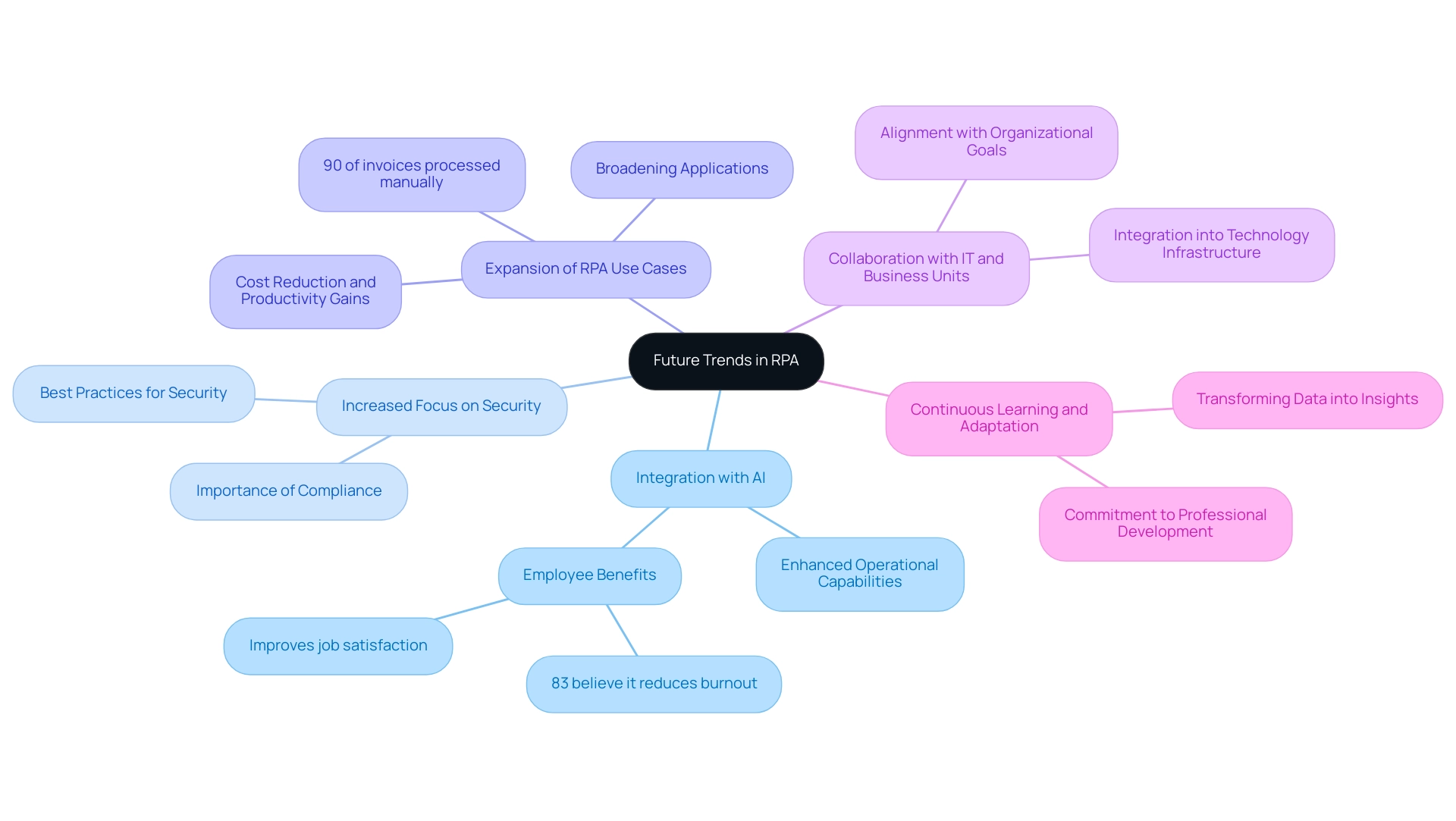
Conclusion
Embracing Robotic Process Automation (RPA) is not just a trend; it is a transformative strategy that empowers organizations to enhance operational efficiency and drive innovation. The role of the RPA Administrator is central to this journey, as they are responsible for the design, implementation, and management of automation solutions that streamline processes and improve productivity. With a focus on continuous improvement and the ability to mitigate operational risks, RPA Administrators are key players in maximizing the benefits of automation.
The multifaceted skill set required for RPA Administrators—including technical proficiency, analytical capabilities, problem-solving skills, and effective communication—underscores their importance in today’s rapidly evolving digital landscape. As organizations increasingly adopt RPA technologies, the demand for skilled RPA Administrators continues to grow, highlighting the critical need for these professionals to navigate the complexities of automation and align initiatives with strategic objectives.
Looking ahead, the integration of artificial intelligence with RPA signals a new era of intelligent automation. RPA Administrators will play a pivotal role in leveraging these advancements to enhance operational capabilities, drive employee satisfaction, and foster innovation. By staying abreast of emerging trends and committing to continuous learning, RPA Administrators will ensure their organizations not only keep pace with technological advancements but also position themselves for sustained growth and competitive advantage in an increasingly automated world. The future of work is here, and RPA Administrators are at the forefront, ready to unlock the full potential of automation for their organizations.

